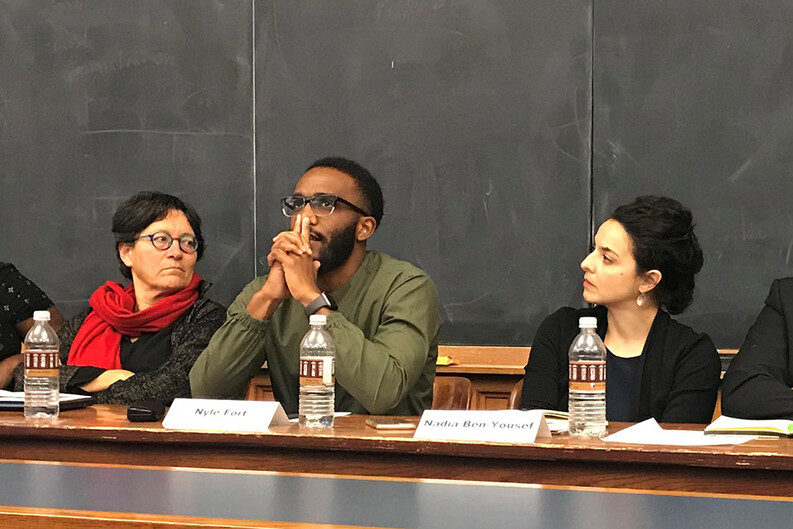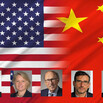Activists from Around the World Discuss “Engaging the Oppressor”

On Thursday, March 22, 2019 the Schell Center hosted a panel of activists from Israel-Palestine, South Africa, and the U.S. to compare their experiences of “engaging the oppressor.” Schell Center Visiting Human Rights Fellow Sari Bashi ’03, who convened the panel, began by explaining that “engaging” could broadly refer to ways in which activists work with or respond to the “oppressor,” which Bashi defined as “groups or institutions in power that violate the rights of others and wield power abusively.” The activists’ discussion reflected a range of understandings of what oppression looks like and what resistance to it means.
The two South African panelists presented starkly different visions of the moral and political benefits and drawbacks of engaging the oppressor. Neeshan Blaton, the Executive Director of the Ahmed Kathrada Foundation, became involved in the resistance against the apartheid regime in 1986 and soon after was put in charge of organizing an underground military unit for the African National Congress (ANC). Blaton explained that the ANC’s engagement with the apartheid regime occurred on several levels simultaneously. At the same time that the ANC pursued armed struggle and rallied the international community to sanction the regime, they also undertook negotiations with the apartheid government. He said that his experience had taught him that “engaging the oppressor is not an issue of principle, but strategy and tactics.” Blaton stressed that the results of these strategies of engagement — and the anti-apartheid struggle overall — were imperfect. He said that the 1994 elections, which brought Nelson Mandela to power, did not make South Africa a completely free nation, but rather gave South Africans the “opportunity to define their own freedom.” Blaton further argued that this opportunity would not have been possible if the ANC had not negotiated a transfer of power with the apartheid government.
Wanelisa Xaba, a Ph.D. student in Women’s and Gender Studies at the University of Cape Town and an activist with the Rhodes Must Fall, Fees Must Fall, and other social movements, disagreed with Blaton’s positive framing of the ANC’s negotiations.
She criticized the ANC for appealing to the “conscience of the white apartheid government” and advocating multiculturalism over Pan-Africanism during the struggle against apartheid. Such tactics, she argued, failed to sufficiently challenge the status quo and improve the situation of people of color in South Africa. Xaba said that the ANC had relied on the fact that the apartheid government had a sense of morality — an assumption she called “dangerous,” because it implies that “oppression is an accident of nature as opposed to a carefully engineered system of psychosocial death.” Xaba, who grew up and lives in a township where food, water, money, and energy are scarce, said, “The 1994 vote and electing a black president didn’t reverse centuries of colonialism,” and added that there is “no such thing as post-apartheid SA — there’s just unlegislated apartheid.”
Nadia Ben-Yousef, the Advocacy Director of the Center for Constitutional Rights (CCR), and Amira Haas, a correspondent for Haaretz who lives in and writes about the Occupied Territories, shared their experiences working for justice in Israel-Palestine. Ben-Yousef contended that lawyering is itself a means of engaging the oppressor, because the law is intrinsically “designed to oppress.” She cautioned, “If you don’t use [the law] properly, you end up legitimizing the system of the oppressor or you get confused about your goals,” but stressed that the law can be “wielded in service of people and movements.”
Ben-Yousef said she drew this lesson from her work at Adalah, a Palestinian-run human rights center in Israel, and at CCR, both of which use strategic impact litigation and other movement lawyering techniques as tools to document harms against oppressed peoples, reduce future harms, and spark conversations about power.
Ben-Yousef explained that advocates must make strategic decisions about whom to target in their work. During her career, the activist groups she was part of decided to stop the “exhausting, humiliating, and slow” process of persuading Israelis that the Palestinians’ “demands for equality were not going to create harm for them,” because these tactics felt ineffective and disingenuous. But she still stressed the importance of promoting an “alternative vision of liberation” that frames freedom as a “collective endeavor,” not one of Palestinians taking their revenge against Israelis.
Haas cautioned activists to be careful about the way they use terms such as “oppressor.” “‘Oppressor’ and ‘dominant’ are not interchangeable — ‘oppressor’ implies choice, ‘dominant’ implies a sociologically determined position,” she explained.
Haas gave the example that “every man is a member of the dominant group, but not every man is an oppressor…the way we use these terms has to be more nuanced or regulated.” She warned against over-personalizing historical phenomena, such as centuries of colonization, as the responsibility of current members of the dominant group. On several occasions, Palestinian activists have accused her of being a colonizer because she is an Israeli Jew, despite the fact that she has spent decades living among Palestinians and writing about human rights abuses committed against Palestinians. “I share their frustration with the way that the world has neglected them in so many forms,” she said, “and how Israel has used the language of peace processes to only deepen processes of colonialization.” But she also argued, “In my school of leftism, we don’t put divides between ethnic and national groups, but between those fighting for equality and those who are working on the side of oppression.” Haas added that such “personalizing of the problem” actually “debilitates the struggle to change this reality.”
Nyle Fort, a minister and Ph.D. student in Religion and African American Studies at Princeton University, reflected on the importance of transnational solidarity in his own activism with the Black Lives Matter movement. Fort became involved in protests in Ferguson that followed the killing of Michael Brown, and he remembers the support protestors got when the police began using tear gas. “Though I’d never been to Palestine,” he said, “I knew from activists on Twitter that milk soothes burning eyes. That was my window into the world of Palestine.” Wanting to know more about why Palestinian activists were interested in black Americans’ struggle, Fort went on a trip to Palestine, where he met Palestinians who struggled against restrictions on water, housing demolitions, and other injustices.
At the panel, Fort drew commonalities between the past and present pressures felt by some Palestinian and South African activists to placate the oppressor and similar trends in the fight for racial justice in the U.S. He recalled, for example, New York City Mayor Bill DeBlasio’s call for a moratorium on protest after two white police officers were killed in December 2014. To Fort, DeBlasio’s approach demonstrated a conflation of protest and violence. It was an example, he said, of black Americans being asked to “announce a commitment to nonviolence in order to soothe white fear of black retaliation, in national moments of racial crisis.”
On the question of whether it was possible to engage the oppressor without sacrificing principles, Fort said, “The way I engage is through struggle and collective decisions. I’m not interested in being a purist. I understand that I’m in the mess and I’m interested in winning.” But at the same time, he said, “[winning] can’t come at the expense of particular values — social transformation is not just about changing the conditions of world, but is also about changing ourselves in that process.”


